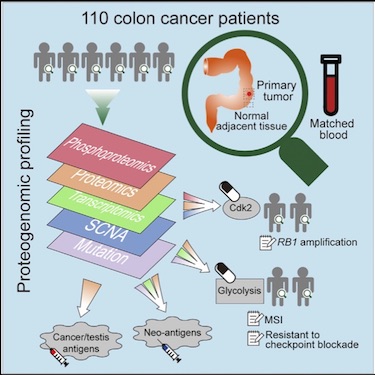Jurisdiction:
United States
Organ System:
Intestine
Funding Organization:
- National Cancer Institute, USA
Research Organizations:
- Baylor College of Medicine, USA
- Pacific Northwest National Laboratory, USA
- Vanderbilt University, USA
- Washington University in St. Louis, USA
- National Cancer Institute, USA
Principal Investigators
:- Bing Zhang
- Tao Liu
- Daniel C. Liebler
- Karin D. Rodland
Publication:
External Links:
The National Cancer Institute’s Clinical Proteomic Tumor Analysis Consortium (CPTAC) is a national effort to accelerate the understanding of the molecular basis of cancer through the application of large-scale proteome and genome analysis, or proteogenomics. Through a coordinated effort by CPTAC-affiliated Proteome Characterization Centers, Proteogenomic Translational Research Centers, and Proteogenomic Data Analysis Centers, CPTAC aims to comprehensively characterize human cancers.
We performed the first proteogenomic study on a prospectively collected colon cancer cohort. Comparative proteomic and phosphoproteomic analysis of paired tumor and normal adjacent tissues produced a catalog of colon cancer-associated proteins and phosphosites, including known and putative new biomarkers, drug targets, and cancer/testis antigens. Proteogenomic integration not only prioritized genomically inferred targets, such as copy-number drivers and mutation-derived neoantigens, but also yielded novel findings. Phosphoproteomics data associated Rb phosphorylation with increased proliferation and decreased apoptosis in colon cancer, which explains why this classical tumor suppressor is amplified in colon tumors and suggests a rationale for targeting Rb phosphorylation in colon cancer. Proteomics identified an association between decreased CD8 T cell infiltration and increased glycolysis in microsatellite instability-high (MSI-H) tumors, suggesting glycolysis as a potential target to overcome the resistance of MSI-H tumors to immune checkpoint blockade. Proteogenomics presents new avenues for biological discoveries and therapeutic development.

